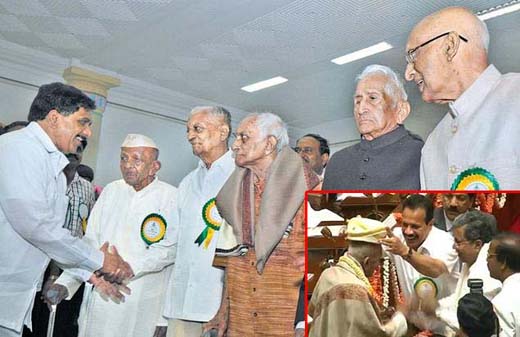
Karnataka Assembly celebrates diamond jubilee
www.mangaloretoday.com
Bangalore, Jun 18, 2012: Aged 103, D G Thimmegowda gracefully accepted felicitations as Karnataka Legislative Assembly marked its 60th anniversary at a special function.
Thimmegowda from Tiptur was feted along with four others - U M Madappa (Chamarajanagar), Mulka Govinda Reddy (Chitradurga), Vasanatha Rao L Patil (Chikkodi Raibagh) and Ambadas Rao (Yadgir) - who were members of the first Assembly constituted on this day in 1952.

Members of the Assembly, Legislative Council, former Chief Ministers and ex-Speakers who were present at the function in the Assembly hall extended their greetings as Chief Minister D V Sadananda Gowda and Leader of Opposition in the Assembly Siddaramaiah garlanded them and presented them momentoes.
Former Chief Ministers M Veerappa Moily, N Dharam Singh, H D Kumaraswamy and B S Yeddyurappa were at hand, as also former Speakers B G Banakar, V S Koujalagi, M V Venkatappa and Krishna during the two-hour function.
Time for celebrations and introspection were the key take-away from the proceedings, presided over by Governor H R Bhardwaj, while former MLA and current Lok Sabha member D B Chandre Gowda spoke about his experience as an Assembly member as also the Speaker and shared his thoughts.
Delivering the key-note address, former Chief Justice of India M N Venkatachaliah said the compulsions of coalition politics have served to erode some fundamental conception of the Westminster model of Parliamentary democracy, including an erosion of the authority of the Chief Ministers and the Prime Minister.
Justice (retd) Venkatachaliah said the increasing political expedience of coalitions has made serious violation of the fundamental assumptions and basic rules of parliamentary democracy.
"For instance, a small party with only a handful legislators helping some other political party to achieve a fragile majority bargains for representation in Government and the Chief Minister would in practice have no control over the behaviour of a member of his Cabinet in view of the political compulsions of coalition politics", he said.
He added: "Virtually, there will be as many Chief Ministers as there are political parties in the coalition government. This is unthinkable in a pure parliamentary system of the Westminster model. The result is that reasoned argument is shelved aside for power. A coalition government cannot be an excuse for dilution of the Prime Minister/Chief Ministerial leadership and primacy".
He also said there is urgent need for institutionalisation of political parties and a comprehensive legislation regulating their registration, functioning and finances.
"So also for electoral reforms which would among other things require 50 per cent plus one vote for success in the elections and give liberty to the voter to reject all candidates on the basis of a negative vote", he said.
He indicated that there is a general sense of disenchantment with institutions of democracy.
"We cannot but say that our main problem today is a combination of vast social and economic disparities and fragile political institutions on the one hand and loss of credibility of the political class and the apathy and indifference of the people on the other", he added.
Courtesy: Deccan Herald